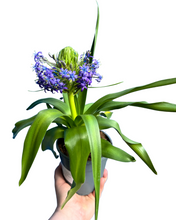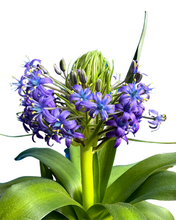Scilla peruviana is part of the Asparagaceae family and its native range is Western and Central Mediterranean where it grows as bulbous geophyte, primarily in the subtropical biome. Scilla peruviana is a stout, bulbous plant which produces dense cone-shaped heads of gentian-blue flowers year on year between May and June. It is considered fully hardy to the UK weather so you could also grow this plant outside.
Genus name means squill; thought to come from Scilla maritima (sea onion). Originally named Hyacinthus stellatus peruanus by Carolus Clusius a 16th Century botanist who mistook the bulbs arriving on a ship called ‘Peru’ for being the country of origin; although I have been unable to find information out about the ship. The California Horticultural Society published an article about the origins of this plant name in 2019. Scilla peruviana experience a winter dormancy but will return the following year.
Light: Bright indirect light, meaning the plant sees the sun for 0-4 hours per day - this could be through trees or a translucent curtain, it’s important for the plant to see the sky in order to thrive. A south- or west-facing window is usually ideal.
Water: Water when the potting mix is halfway dry during spring and summer; reduce watering when flowering has finished, water sparingly in winter.
Potting mix: A gritty well draining mix; recommendations online suggest two parts John Innes No.2, one part leaf mould and one part grit or using a cactus and succulent mix.
Fertilising: during the growing season. You can dilute fertiliser to half the recommended amount but never add more.
Temperature: 15-24˚C. If you keep this plant outside, I would recommend overwintering in a cold frame.
Humidity: Moderate humidity, 40-50%.
Scilla are toxic, keep out of reach of pets and children.



